| Listing 1 - 10 of 1005 | << page >> |
Sort by
|
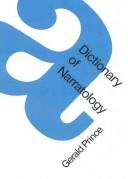
ISBN: 0803236786 9780803287761 0803287763 1496203917 9781496203915 Year: 1987 Publisher: Lincoln, Neb.
Abstract | Keywords | Export | Availability | Bookmark
 Loading...
Loading...Choose an application
- Reference Manager
- EndNote
- RefWorks (Direct export to RefWorks)
History, literature, religion, myth, film, psychology, theory, and daily conversation all rely heavily on narrative. Cutting across many disciplines, narratology describes and analyzes the language of narrative with its regularly recurring patterns, deeply established conventions for transmission, and interpretive codes, whether in novels, cartoons, or case studies. Indispensable to writers, critics, and scholars in many fields, A Dictionary of Narratology provides quick and reliable access to terms and concepts that are defined, illustrated, and cross-referenced. All entries are keyed to articles or books in which the terms originated or are exemplified. This revised edition contains additional entries and updates some existing ones.
Fiction --- Discourse analysis, Narrative --- Narration (Rhetoric) --- Rhetoric --- Narratees (Rhetoric)
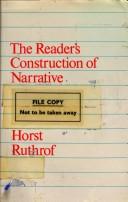
ISBN: 0710006624 Year: 1981 Publisher: London Routledge and Kegan Paul
Abstract | Keywords | Export | Availability | Bookmark
 Loading...
Loading...Choose an application
- Reference Manager
- EndNote
- RefWorks (Direct export to RefWorks)
Fiction --- Narration (Rhetoric) --- Narrative (Rhetoric) --- Narrative writing --- Rhetoric --- Discourse analysis, Narrative --- Narratees (Rhetoric) --- Narration (Rhetoric).
Book
ISBN: 1299410820 3035103941 Year: 2012 Publisher: Bern, Switzerland : Peter Lang,
Abstract | Keywords | Export | Availability | Bookmark
 Loading...
Loading...Choose an application
- Reference Manager
- EndNote
- RefWorks (Direct export to RefWorks)
The present volume is a contribution to the theory of narrative by scholars from various disciplines, mainly scholars from Comparative Literature but also contributors from Philosophy, Psychology and the languages. The essays focus on central terms and concepts in narrative theory over the last forty years. Established narratological concepts, such as narrative, narrator, story, fiction, character, narrative (un)reliability and point of view, but also relational concepts motivated by the expansion of narratology, such as narrative and non-verbal media, narrative and personal identity and narrative and literary genre, are themes dealt with. In addition to presenting a critical examination of the core concepts of narrative theory, the volume is a demonstration of the vigour of contemporary Nordic narrative theory. The authors work at universities in Denmark, Estonia, Finland, Norway and Sweden, and they all belong to the Nordic Network of Narrative Studies.
Narration (Rhetoric) --- Narrative (Rhetoric) --- Narrative writing --- Rhetoric --- Discourse analysis, Narrative --- Narratees (Rhetoric)
Book

ISBN: 3110555905 3110556855 9783110556858 9783110555905 3110555646 9783110555646 Year: 2017 Publisher: Berlin Boston
Abstract | Keywords | Export | Availability | Bookmark
 Loading...
Loading...Choose an application
- Reference Manager
- EndNote
- RefWorks (Direct export to RefWorks)
Narrative/s in Conflict presents the proceedings of an international workshop, held at the Trinity Long Room Hub Dublin in 2013, to a wider audience. This was a cross-disciplinary cooperation between the comparative research network 'Broken Narratives' (University of Vienna), the research strand 'Identities in Transformation' (Trinity College Dublin) and the Graduate Center for the Study of Culture at the University of Giessen. What has brought this informal network together is its credo that theories of narrative should be regarded as an integral part of cultural analysis. Choosing exemplary case studies from early Habsburg days up to the the wars and genocides of the 20th century and the post-9/11 'War on terror', our volume tries to analyze the relation between representation and conflict, i.e. between narrative constructions, social/historical processes, and cultural agon. Here it is crucial to state that narratives do not simply and passively 'mirror' conflicts as the conventional ‘realistic’ paradigm suggests; they rather provide a symbolic, sense-making matrix, and even a performative dimension. It even can be said that in many cases, narratives make conflicts.
Narration (Rhetoric) --- Narrative (Rhetoric) --- Narrative writing --- Rhetoric --- Discourse analysis, Narrative --- Narratees (Rhetoric) --- Narrative, culture, conflict, rupture.
Book
ISBN: 9781496217141 1496217144 9781496218537 9781496218544 9781496218551 1496218558 1496218531 Year: 2019 Publisher: Lincoln: University of Nebraska Press,
Abstract | Keywords | Export | Availability | Bookmark
 Loading...
Loading...Choose an application
- Reference Manager
- EndNote
- RefWorks (Direct export to RefWorks)
"Handbook of Narrative Analysis is the go-to book for understanding and interpreting narrative. Luc Herman and Bart Vervaeck have revised and extended the first edition by describing and applying the last fifteen years of cutting-edge scholarship in the field of narrative theory"--
Narration (Rhetoric). --- Narration (Rhetoric) --- Narrative (Rhetoric) --- Narrative writing --- Rhetoric --- Discourse analysis, Narrative --- Narratees (Rhetoric) --- E-books
Book
ISBN: 1469656590 1469656582 Year: 1984 Publisher: Chapel Hill, North Carolina : University of North Carolina Press,
Abstract | Keywords | Export | Availability | Bookmark
 Loading...
Loading...Choose an application
- Reference Manager
- EndNote
- RefWorks (Direct export to RefWorks)
Narration (Rhetoric) --- Narrative (Rhetoric) --- Narrative writing --- Rhetoric --- Discourse analysis, Narrative --- Narratees (Rhetoric)
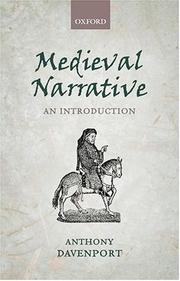
ISBN: 0191587982 1280759119 9786610759118 1423753178 9781423753179 0199258392 1383040028 Year: 2004 Publisher: Oxford Oxford University Press
Abstract | Keywords | Export | Availability | Bookmark
 Loading...
Loading...Choose an application
- Reference Manager
- EndNote
- RefWorks (Direct export to RefWorks)
'Medieval Narrative' offers students an introduction to the range of narrative genres and strategies of the medieval period and explores the ways in which medieval theories of narrative can be compared with modern day theories.
Literature, Medieval --- Narration (Rhetoric) --- History and criticism. --- History --- Rhetoric --- Discourse analysis, Narrative --- Narratees (Rhetoric)
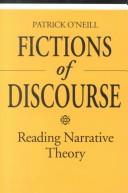
ISBN: 1281997595 9786611997595 1442674865 9781442674868 0802079482 9780802079480 Year: 1996 Publisher: Toronto
Abstract | Keywords | Export | Availability | Bookmark
 Loading...
Loading...Choose an application
- Reference Manager
- EndNote
- RefWorks (Direct export to RefWorks)
The fundamental principle upon which contemporary narratology is constructed is that narrative is an essentially divided endeavour, involving the story (`what really happened') and the discourse (`how what happened is presented'). For traditional criticism, the primary task of narrative discourse is essentially to convey the story as transparently as possible. Patrick O'Neill investigates the extent to which narrative discourse also contains the counter-tendency not to tell the story, indeed to subvert the story it tells in foregrounding its own performance. The systemic implications of this perspective for narrative and for narrative theory are examined within the conceptual framework provided by classical French narratology. O'Neill ultimately attempts both to expand and to problematize the structural model of narrative proposed by this centrally important tradition of narrative theory. O'Neill describes narrative as functioning in terms of four interacting levels: story, narrative text, narration, and textuality. Using a range of examples from Homer to modern European fiction, he discusses traditional narrative categories such as voice, focalization, character, and setting, and reinscribes them within the contextual space of author and reader to bring out narrative's potential for ambiguity and unreliability. He also discusses the implications of translation for narrative theory.
Narration (Rhetoric) --- Narrative (Rhetoric) --- Narrative writing --- Rhetoric --- Discourse analysis, Narrative --- Narratees (Rhetoric)
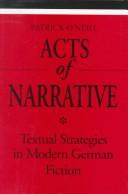
ISBN: 1282009486 9786612009488 1442670606 9781442670600 0802009824 9780802009821 Year: 1996 Publisher: Toronto
Abstract | Keywords | Export | Availability | Bookmark
 Loading...
Loading...Choose an application
- Reference Manager
- EndNote
- RefWorks (Direct export to RefWorks)
O'Neill's approach rests on three assumptions: first, that all stories are stories told in particular ways; second, that these particular ways of telling stories are interesting objects of study in and for themselves; and third, that modern German fiction includes a number of narratives that allow us to indulge that interest in ways that are themselves compelling. The relationship of story and discourse is central to Acts of Narrative; in particular, each of the texts under analysis continually foregrounds the active role of the reader, which O'Neill sees as an inescapable feature of modern and postmodern narrative as a semiotic structure. The volume might be described as an exercise in semiotic narratology, exploring a variety of aspects of the semiotics of narrative as a discursive system. Because German literary criticism tends to be strongly historicist in character, modern and postmodern German narrative has remained relatively unexplored by poststructuralist critics. In the eight individual analyses of twentieth-century German texts that make up this book, Patrick O'Neill deviates from the theoretical mainstream. O'Neill applies the principles of structuralist and poststructuralist narratology to a selection of narratives from both modernist and postmodernist German authors: Mann, Kafka, and Hesse, and Canetti, Johnson, Handke, and Bernhard.
German fiction --- Narration (Rhetoric) --- History and criticism. --- History --- Rhetoric --- Discourse analysis, Narrative --- Narratees (Rhetoric) --- Deutsch.
Book
ISBN: 1443892483 9781443892483 9781443888110 Year: 2016 Publisher: Newcastle upon Tyne
Abstract | Keywords | Export | Availability | Bookmark
 Loading...
Loading...Choose an application
- Reference Manager
- EndNote
- RefWorks (Direct export to RefWorks)
This volume is centred around the idea that the aim of literature is to build bridges, to bring people together, and to highlight underlying similarities despite the apparent differences in world literatures. As such, the book focuses on the moral purpose of literature and its tendency to overcome divisive forces. It supports the idea of cosmopolitanism, a re-working of the ancient Indian ideal of Vasudhaiva Kuttumbakam, or 'the world is my home', a concept close to the African notion of 'ubuntu', which refers to an open society (as against a small, enclosed one) and relates to the essence of
Narration (Rhetoric) --- Narrative (Rhetoric) --- Narrative writing --- Rhetoric --- Discourse analysis, Narrative --- Narratees (Rhetoric)
| Listing 1 - 10 of 1005 | << page >> |
Sort by
|

 Search
Search Feedback
Feedback About UniCat
About UniCat  Help
Help News
News